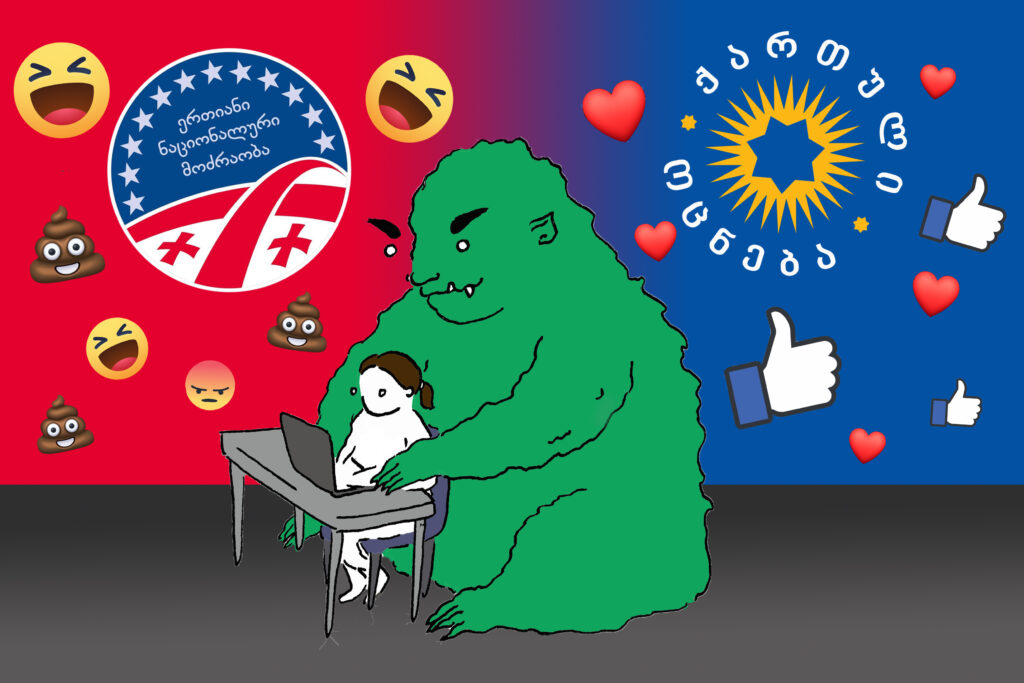At 17 years old, Nino (not her real name) joined Georgian Dream’s youth wing excited to work for the country’s ruling party before an election. But three months of social media manipulation, lies, broken promises, and tedium left her distressed and disillusioned.
In September of last year, my friend told me that Georgian Dream were recruiting for their youth wing in Rustavi and I decided to sign up.
I had a lot of free time because I was in my final year of secondary school, and could come and go when I wanted to. I decided I’d join, just to have something to do. It seemed a good opportunity: I’d learn something new, get some work experience, and we were promised a salary of ₾300–₾400 ($110–$150) per month.
But when I got there in January 2022, the reality was completely different to what I’d imagined, and it only got worse in the months that followed. Over the course of the three months I worked for Georgian Dream, I found that they had lied to us about almost everything.
Trolling the opposition
When I turned up at the office, the first thing that struck me was my new colleagues. I had thought that working for Georgia’s ruling party, I’d be working with people a bit older than me, and that the work would be very serious.
Instead, I found that I was in a team of girls, all around my age, and all of us pretty and pleasant. Our main task was to secure votes for Georgian Dream ahead of the upcoming by-election in Rustavi, but the way they got us to do this was sometimes very strange.

When we first arrived, practically no one paid any attention to us — neither the head of the youth wing in Rustavi nor the party representatives who came from Tbilisi. They introduced themselves and talked about themselves, but they didn’t interact with us.
We were split into groups, and each group had a leader; ours was called Lazare. As we were all girls, he called us ‘Lazare’s Angels’, and gave our team messenger chat the same name.
At first, we were told that all our work would be on social media. We didn’t create fake profiles — we posted everything from our own Messenger and Facebook accounts.
They started us on comments. For example, we were asked to post blue hearts under posts by or supporting Georgian Dream, like those posts, use hashtags, wish candidates good luck in the elections, and share posts on our own pages, all with the aim of making it look like some kind of youth flashmob.
We also had to make fun of the opposition. Our group was told to comment under posts by [opposition leader and former president] Mikheil Saakashvili — we were told to react with ‘haha’ and write something to humiliate or shame him.
Everyone else in the group immediately did what Lazare had asked them to do, but I refused. I said that our duties did not include being mean to other people.
Lazare didn’t force me to post and didn’t directly address the issue, but he was furious. He wondered what the problem was — why wouldn’t I just post a laughing face under Misha’s post? But that was something I wouldn’t do. How could I make fun of a person? And particularly on someone else’s orders.
Getting friends, family, and neighbours to vote
In addition to our work on social media, one of our main tasks was mobilising votes, both from strangers and from our friends and family.
I remember we were told to collect the data of 30 people close to us who were definitely going to vote for Georgian Dream.
Earlier in the year, they had used the tactic of knocking on doors in blocks of flats and asking people who they were going to vote for. They realised this tactic was unreliable, so decided to try something new with us.
They wanted us to collect the data of our family and friends, and we were told that if we collected the data of 30 people who were definitely going to vote for Georgian Dream in two weeks, we would be paid. We had to provide their first and last name, ID number, phone number, and address.
I asked my relatives to fill out the questionnaire, but they laughed and said they were not going to vote for Georgian Dream so I couldn’t have their details. Other girls began to cheat, filling out the sheets with names of strangers, or names they’d invented.
We were then given lists of people whose data had been collected by us and other teams and had to type the information into a computer system.
We were supposed to be paid ₾50 ($18) for three days of this work, but none of our group was given a salary. Another group was paid, which we only learnt about through friends.
We also spent a day working in a call centre in the same building. We called people who lived in Rustavi to ask them who they had voted for. Some people reacted calmly, others got angry and said that it was none of our business.
They also sometimes gathered school teachers there. They would bring them to the office to talk about ‘new projects’. I don’t know what they spoke about; they were all taken to the second floor, and when we went up there to work, the staff explained to us very rudely that we weren’t allowed to be there, and forced us to go downstairs quickly.
In the end, the Georgian Dream candidate, Irakli Shatakishvili, won the by-election with 90% of the vote.
Broken promises and missing salaries
A lot of the time, we seemed to just be there to sit under the CCTV cameras.
Our team leader needed to be able to prove that his boss was involving young people in the election campaign.
It didn’t, however, matter whether we were actually doing anything useful, so all the time we had been told we would spend doing exciting activities, we instead spent sitting in a room doing nothing. We were told we could scroll on our phones but we had to turn up every day, and they were pretty strict about that.
There were 28 girls in my group, and the leader told us that at least 14 of us had to be there every day.
I often returned home disappointed because I had thought that today it would go differently; that we would do something useful, that they would appreciate what we were doing and how we did it. What I didn’t know was that the worst was yet to come.
We had got through three months of having our time wasted in part driven by the promise of our salaries. We had been promised ₾300–₾400 per month, which isn’t bad for a first job, particularly in Rustavi.

But even that turned out to be a lie. In the end, we were paid just ₾100 ($36) each for the entire three months, although they gave it to us so begrudgingly and angrily, you’d have thought we’d asked for double the salaries we’d been promised.
Our team leader was angry when we challenged him about this, and curtly explained that he also had a boss, so it wasn’t his fault. But we knew from friends that other Georgian Dream youth groups in Rustavi had been paid ₾300 ($110). We had done everything well and as we had been told to, even if I’d had a minor conflict with our team leader.
But in the end, there was nothing we could do. We hadn’t signed a contract, and they’d said at the beginning, as we were just starting work, we’d get our salaries later. At the time, that seemed fine to me. I’d never had a job before, so it was only when they broke all their promises that I realised why these documents mattered.
I felt deceived, but I couldn’t do anything.
A shove on the way out
In March, I decided that it was time to end this, I didn’t like anything about what we were doing. I sent a message to my friends, and gathered my strength to come to the office and tell Lazare that I no longer want to work with them.
Just as I was about to write to Lazare to arrange a meeting, I received an angry message from him: ‘What, you told your girls or some boys that you were leaving, but you couldn’t write one message to me? That’s just irresponsible.’
I explained that I had been about to write to him, had only mentioned it to the girls I worked with, and that I was a little intimidated. That conversation turned out to be the end of my time at Georgian Dream.
A few days later, I went to the office to pick up something from a friend. When I got to the door, Lazare was there. He looked at me with disdain, and asked what I was doing there, but walked away without waiting for an answer, shoving me with his shoulder as he left.
And that was how my time at the offices of Georgian Dream came to a close — with no contract, a salary of ₾100 for three months of full-time work, and a push on my way out.




 28 October 2022
28 October 2022




